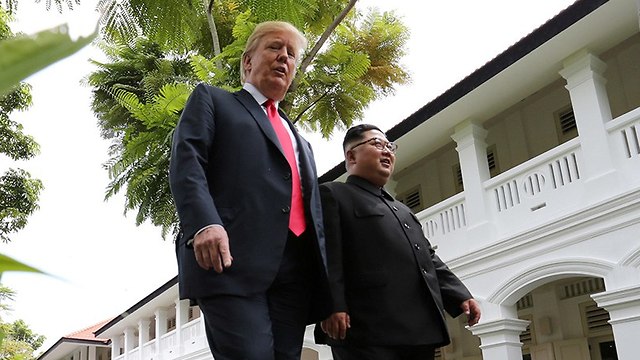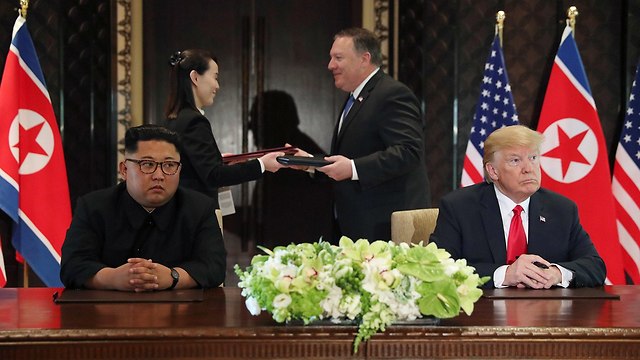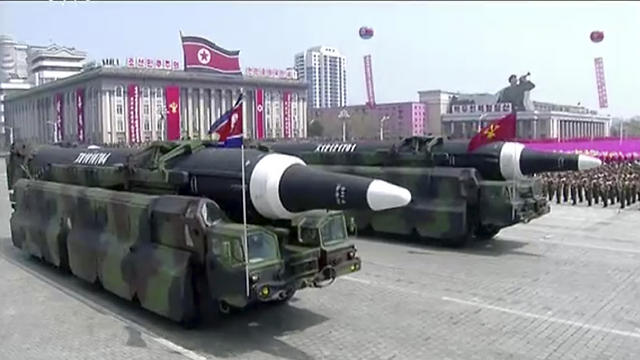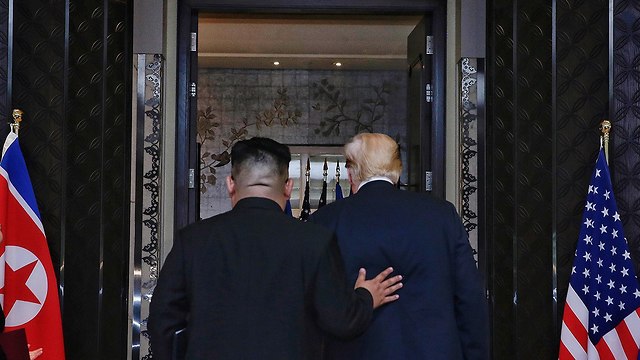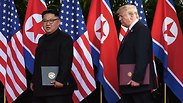
Singapore summit won’t bring peace on earth, but it does prevent a war
Analysis: The Trump-Kim meeting won’t improve human rights and the humanitarian situation in North Korea, but it relieves tensions and prevents a military conflict. Like Obama in the nuclear agreement with Iran, Trump agreed to exclude the ballistic missile issue—which Israel is particularly concerned about—from the written understandings with North Korea.
His self-confidence was apparent even when he implied there was no guarantee that the understandings he had reached with North Korean leader Kim Jong-un would actually be implemented. “I may stand before you in six months and say, ‘Hey, I was wrong,’” he said.
That’s the way a sober, realistic person talks, and Trump hasn’t been perceived as such a person so far. He truly believes that the deal he concocted will be executed, or at least most of it. Why is he so confident that his joint statement with Kim won’t remain on paper?
The main reason is the long preparation talks between the parties, which led to a document that offers an indirect response in principle to the main problems preventing peace and stability in the Korean peninsula in particular and in Eastern Asia in general.
This fact is important not only for the region’s residents but for the entire world as well, as the explosive situation of the past 70 years between the Koreas, and between them and Japan, is a real threat to world peace—especially since last year, when it turned out that North Korea has nuclear and missile abilities that threaten not only its neighbors but also the United States and China.
While agreements in principle aren’t practical, the fact that the parties made trust-building moves even before the historic summit in Singapore gives us a reason to believe that both of them—including North Korea, which deceived the US in the past—are seriously intending on performing a strategic and reliable change in their relations.
We mustn’t have any illusions. This isn’t about an improvement of the human rights situation and the humanitarian situation in North Korea. This isn’t about peace on earth either. This is about an agreement—in principle for now—to relieve tensions and prevent a nuclear war. Some will say it isn’t much and that it’s still far from actual fulfillment, but it’s much better than the situation on the eve of the summit, when North Korea and the US threatened each other with war.
Besides, experience shows that just like there is a “dynamic of escalation” which leads to war although the parties aren’t interested in war, there is also a “dynamic of de-escalation” which starts with small steps and gains momentum if they succeed.
Bilateral trust-building moves
Based on the Singapore statement, and mainly on Trump’s press conference, we can see that both sides are already offering trust-building gestures to each other.
Kim, for example, “gave” Trump during the talks—apparently without the negotiation teams discussing it earlier—the demolition of the test stand for intercontinental ballistic missiles and agreed to recover and return the remains of American POWs and MIAs from the Korean War which ended in 1953, in addition to the other gestures that North Korea has already offered South Korea and the United States in the past few months.
Trump rewarded Kim by halting joint military exercises with South Korea on South Korean territory. These annual war games have irritated the North Korean leaders throughout the generations and served as a regular source of tensions and even exchanges of fire between the two Koreas.
The American president also froze some of the sanctions he imposed on North Korea last year and said he avoided imposing another 300 sanctions that had been planned.
It’s clear, however, that Trump arrived at the summit with a fear of being perceived as a sucker, which is why he didn’t announce a pullout—not even a partial one—of the 32,000 soldiers stationed on North Korean territory and didn’t announce that the sanctions would be lifted.
The American and South Korea negotiation teams deserve a compliment for working for months on a balanced package of trust-building steps and on the agenda of the negotiations which will now begin on North Korea’s demilitarization of nuclear weapons and intercontinental missiles threatening the US.
This issue is the reason Trump essentially legitimized North Korea’s totalitarian oppressive regime. The Singapore meeting was a recognition of this regime, and the reward is supposed to be the denuclearization of one of the least predictable and stable countries in the world. This is the equation presented by Trump, and this time we can believe him.
Within two or three months, we will likely be able to know whether the process launched on Tuesday will lead to practical results. Trump promised that the practical negotiations would begin as early as next week. They will be led by Secretary of State Mike Pompeo, who successfully tailored the understandings that led to this summit. National Security Advisor John Bolton will be involved in the negotiations too. It is still unclear who will lead the negotiations on behalf of North Korea, but we will likely find out in the coming days.
In this context, it’s important to mention one of Trump’s quick comments during the press conference, that the North Korean leader faced resistance within his regime to the strategic move he was making and might want a few more days to take care of his internal rivals and then declare who will negotiate with the US.
What will be discussed in the negotiations?
The negotiations will focus on four main issues:
1. The first issue, the denuclearization of North Korea, is the most complicated issue, as it is a technically and scientifically complex process which could last months and maybe even a year or two. This process requires strict supervision and verification to prevent North Korea from deceiving the US, as it has done before.
Trump implied that this supervision would be carried out by teams of American and international experts, scientists and engineers. He was likely referring to the International Atomic Energy Agency (IAEA), which will now have to double if nor triple its number of employees. The entire process depends on the small details of this issue.
By the way, the joint statement doesn’t mention the ballistic missiles. This is where Trump resembles former President Barack Obama, who accepted the Iranian demand to exclude the development and production of ballistic missiles from the nuclear agreement with the world powers. It seems that the North Koreans are also refusing to disarm of their ballistic missiles, which is why they refused to include them in the Singapore statement.
The shutdown of North Korea’s ballistic missile test site is likely aimed at serving as a fig leaf in this matter. We’ll see if Trump insists on this issue later on in the process. The ayatollahs in Tehran are, naturally, monitoring the issue of North Korea’s ballistic missiles with a great amount of interest. If Trump gets North Korea to stop developing and producing intercontinental ballistic missiles, it will serve as a milestone both for Iran and for European Union countries, which are trying to improve the nuclear agreement with Iran. This is, therefore, an issue Israel is particularly concerned about.
2. The second issue in the negotiations is the establishment of new relations—in other words, peace between the United States and North Korea. The Korean War ended in 1953 with armistice agreements that prevented any diplomatic or other relations between the two countries. The negotiations for peace, in which the US will officially recognize North Korea, appear to be in an advanced stage.
3. The third issue is peace between North Korea and South Korea. The two countries have already signed a series of agreements aimed at leading to normalization between them. All the agreements since the 1950s have collapsed one way or another, but now there is an opportunity to end the war in this aspect too. According to the wording of the statement, the achievement of normalization and peace between the Koreas—and between the US and North Korea—appears to be contingent on the dismantlement of the North Korean nuclear project.
4. The fourth issue is the recovery and return of the POWs and MIAs.
There is also a fifth issue, which is completely excluded from the Singapore statement: Human rights and the humanitarian situation in North Korea. After the euphoria in the White Houses and in the US over the meeting and its achievements dies down, this issue will be raised in greater volume and the media won’t leave Trump alone. The American president is right, however, when he estimates that if only part of the agreements achieved in Singapore are implemented, the North Korean people stand to benefit from it too. At least their economic situation will improve.










